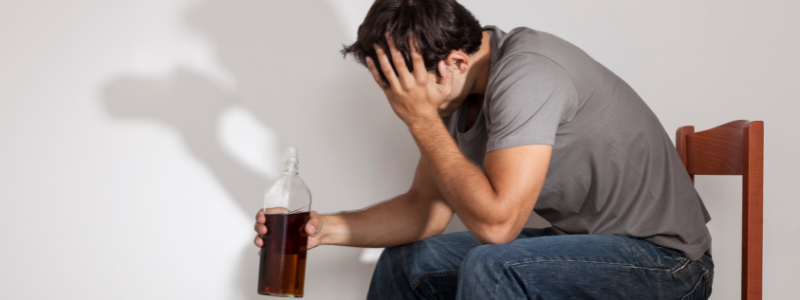Walk through your nearest town, turn on the T.V., or just take a peek in your fridge — chances are you’ll come across a bottle or can of something alcoholic. Alcohol consumption is embedded in our everyday culture. But, as we all know, it’s not without its problems.
Excessive alcohol consumption is responsible for more than 95,000 deaths in the U.S. each year, making it the third leading cause of preventable death.
What’s more, according to the 2019 National Survey on Drug Use and Health (NSDUH), 14.5 million people aged 12 or over (equivalent to 5.3% of the age group) were dealing with an Alcohol Use Disorder (AUD) at the time of the survey.
When drinking alcohol is part of so many people’s daily or weekly routines, it can be hard to determine where to draw the line. It’s common to question why do I drink so much? Or, when is drinking a fun, sociable activity? And when does it become a problem? This article will help you to answer those questions.
Read on to discover what moderate drinking actually means and learn how to spot signs that your alcohol consumption may have gotten out of control.
Why Do We Drink?
Humans have consumed alcohol for thousands of years—it’s a fairly ingrained and accepted aspect of life in America.
According to the 2019 NSDUH:
- 85.6% of U.S. adults drank alcohol at some point in their lifetime
- 59.1% of men consumed alcohol in the past month
- 51% of women living in the U.S. consumed alcohol
But why do we do it? Why do I drink so much alcohol?
When we drink alcohol in light to moderate amounts, endorphins are released in certain areas of the brain. These endorphins are “feel good” chemicals with the power to boost feelings of happiness and confidence and reduce feelings of anxiety or depression — albeit temporarily.
- It’s a high that many of us seek out time and again.
- We drink to lose our inhibitions and feel more confident in social situations.
- We drink to join in and celebrate social occasions. It can be hard to say no to an alcoholic beverage when everyone around you is enjoying one.
People also use the initial anti-anxiety properties of alcohol to relieve stress and unwind after a busy week. More worryingly, some people drink to escape, avoid or regulate unpleasant emotions. Drinking to cope with problems is more likely to lead to alcohol abuse.
When does alcohol intake become unhealthy?
Some medical researchers argue that alcohol is never a healthy choice. And certain groups, such as pregnant women and people under the age of 21, shouldn’t consume any alcohol whatsoever.
For others, drinking within moderation can minimize the risk of alcohol-related harm to your health, work, and relationships.
Moderate drinking
CDC defines moderate drinking as:
- No more than one alcoholic beverage per day for women.
- No more than two alcoholic beverages per day for men.
They define one alcoholic beverage as:
- 12 ounces of beer, with a 5% alcohol content
- 8 ounces of malt liquor, with a 7% alcohol content
- 5 ounces of wine, with a 12% alcohol content
- 1.5 ounces of distilled spirits or liquor, with a 40% alcohol content.
Think about the last time you had an alcoholic drink. How does it measure up? It’s all too easy to go past moderate drinking and into “excessive” territory.
Excessive drinking
Unhealthy or excessive drinking can take many different forms, with binge drinking being the most damaging.
Binge drinking can be defined as:
- When a woman consumes 4 or more alcoholic beverages on a single occasion
- When a man drinks 5 or more alcoholic drinks on a single occasion
All people should also avoid heavy drinking. This is when:
- A woman consumes 8 or more alcoholic beverages per week
- A man consumes 15 or more alcoholic beverages per week
Excessive drinking is harmful to your health, but it doesn’t necessarily mean you’re addicted to alcohol.
Over time, however, excessive drinking can lead to Alcohol Use Disorder (AUD). AUD is a chronic disease that can be mild, moderate, or severe. It’s also known as alcohol dependence or alcoholism.
Why Do I Drink So Much Alcohol?
If you regularly drink more than is recommended by the CDC, you should aim to cut down your alcohol intake. This will help to minimize the risk alcohol poses to your health and general wellbeing.
If you’re reading this because you already feel you’ve lost control of your alcohol consumption, you may have AUD, and you may need additional support.
- AUD is different from habitual drinking. AUD sufferers find it extremely difficult to reduce their alcohol intake. For them, alcohol misuse negatively affects their relationships, professional life, and physical and mental health.
- In AUD sufferers, excessive consumption of alcohol has caused changes to the brain. This makes it very difficult to stop drinking, even when you really want to.
Some of the symptoms of AUD include:
- Feeling unable to limit the amount of alcohol you drink
- Continuing to drink despite the health, work, and relationship problems it causes
- Needing to drink more and more to achieve the same effect
- Wanting a drink so badly that you can’t think of anything else
- Prioritizing drinking over activities you would have once enjoyed
- Experiencing withdrawal symptoms — such as shakiness, restlessness, nausea, a racing heart, or feeling low — when the effects of alcohol wear off.
If you recognize even a few of these symptoms, it’s essential to seek help. No matter how severe your AUD, there are a number of effective treatment options to try.
Finding help for alcohol addiction
According to the 2019 NSDUH, only 7.2% of people with AUD had received any treatment over the past year. That means many people are dealing with AUD without any professional support. And this is something that the AspenRidge team is trying to change. AspenRidge Recovery likes AUD treatment accessible. We structure a treatment program around each client — adapting to their schedule, responsibilities, and clinical needs.
We also do more than just treat a client’s alcohol addiction. Our experienced therapy team works to understand and treat any underlying trauma, depression, anxiety, or PTSD, helping clients remove barriers to long-term sobriety.
The first step to recovery? Contact our addiction specialists to schedule an assessment. They’re available 24/7 on (719) 259-1107 and are always here to help.







